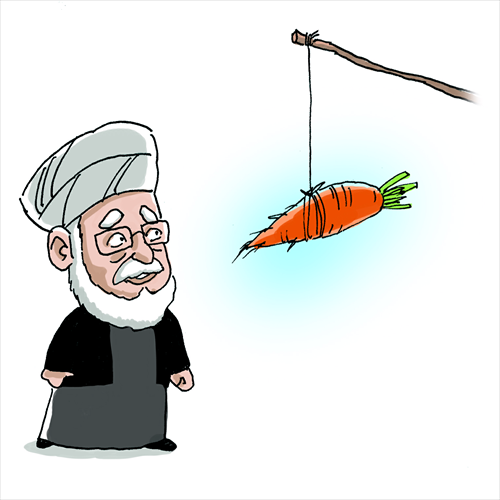


Illustration: Liu Rui/GT
Prophecy is a dangerous business, especially when the oracle has a vested interest in ensuring a specific outcome. Nowhere is this more obvious than in the current debate regarding the nuclear agreement with Iran that will hopefully be finalized by June 30. A common complaint is that after 10 to 15 years, Iran will be freed from most of the constraints of the planned agreement and be free to develop its nuclear infrastructure, most notably the nation's capability to produce nuclear fuel that could be quickly turned into weapons-grade materials.
The critics point to this and claim that after the agreement lapses, Iran will ramp up its nuclear industry and start churning out nuclear weapons by the truckload. In some cases, these hysterical complaints are accompanied by grim graphics of nuclear explosions. Usually, these articles call for an agreement that permanently prohibits any Iranian nuclear development, a demand that finds no purchase outside of the US and Israel. More importantly, these critics miss the simple fact that in terms of international and domestic politics, a decade is a literal eternity for all the countries involved. In 1980, the US and the USSR were locked in the Cold War, with many fearing that the decade would only end with the Cold War becoming an outright military conflict. However, by 1990 the global situation had changed beyond recognition and by 1991 the USSR itself had ceased to exist. Today, we see that the prophets of 1980 were almost universally wrong in their predictions. Additionally, few predicting Iran's future in 1970 would have anticipated the overthrow of the Shah or the emergence of an Islamic Republic.
Should this agreement be finalized, in 10 years time Iran is likely to find itself closely connected with the larger world economy, quite possibly including the US. As has happened with other nations, an Iran that is dependent on international commerce may be unwilling to take actions that might damage its economic position.
Furthermore, this future Iran will have a government that has become used to a less confrontational relationship with the rest of the world. Indeed, given the pragmatic interests Iran and the US share, it is not out of the realm of possibility that the two nations may find themselves cooperating on a variety of issues. A sudden Iranian rush to a nuclear capacity after the proposed agreement's restrictions lapse would jeopardize all of that for little real gain.
Perhaps most disturbing are the underlying assumptions many of these would be prophets hold regarding Iran and the Iranian people. Iran will be a danger in 10 years because Iran will always be a danger to these individuals. Oftentimes, these are the same individuals who seem to believe that not only is Iran seeking nuclear weapons, but also that Iran intends to use those nuclear weapons in some suicidal gesture against the US or Israel.
They commonly describe the leadership of Iran as fanatical and irrational, despite the fact that the leadership, while opposed to the US, has largely shown itself to be very pragmatic in its conduct of foreign affairs. The claim that Iran will still be a threat in a decade is based on the idea that Iran's government is an existential threat to the US, usually ignoring the documented history of US actions against Iran. Many critics have also argued for regime change in Iran, despite the disastrous example of the US' Iraq adventure and its regional consequences.
Ultimately, this agreement is a good one because it provides both nations with the opportunity to remake a relationship that has been marked by confrontation rather than by cooperation, despite the fact that the two nations share a number of vital interests.
This agreement presents the opportunity for the US to engage Iran on a variety of issues, not merely those related to Iran's nuclear program. By doing so, the US can encourage Iran's participation in the world's economy in a way that will provide a positive incentive to avoid the development of nuclear weapons. Such an arrangement, by providing pragmatic reasons for cooperation and engagement by all parties, will do far more to reduce the danger of nuclear proliferation in Iran than any number of punitive actions.
The author is a freelance writer based in Corona, California. charlesgray109@gmail.com
 J-11 fighters in air exercise
J-11 fighters in air exercise Beauties dancing on the rings
Beauties dancing on the rings Attendants-to-be join Mr. & Miss Campus Contest
Attendants-to-be join Mr. & Miss Campus Contest Beijing's toughest anti-smoking law takes effect
Beijing's toughest anti-smoking law takes effect Family lives in cave for about 50 years in SW China
Family lives in cave for about 50 years in SW China PLA soldiers operating vehicle-mounted guns in drill
PLA soldiers operating vehicle-mounted guns in drill Blind carpenter in E China's Jiangxi
Blind carpenter in E China's Jiangxi China hosts overseas disaster relief exercise for the first time
China hosts overseas disaster relief exercise for the first time 20 pairs of twins who will become flight attendants in Sichuan
20 pairs of twins who will become flight attendants in Sichuan Obama is sowing discontent in S.China Sea
Obama is sowing discontent in S.China Sea Rescuers work through night to reach cruise ship survivors
Rescuers work through night to reach cruise ship survivors Driving through limbo
Driving through limbo Facing down MERS
Facing down MERSDay|Week